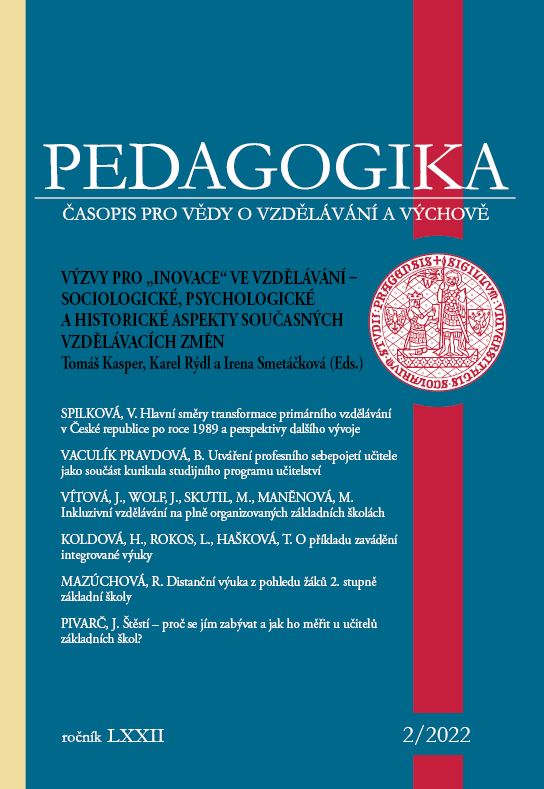Inclusive Education in Fully Organized Primary Schools
DOI:
https://doi.org/10.14712/23362189.2021.2067Keywords:
inclusion, primary schools, internships, pre-service teachersAbstract
Objective: The aim of the study is to map the inclusive approaches of the fully organized schools in which pre-service teachers undergo their internships. It focused on what are called cooperating schools that accept undergraduate students of a primary school teacher training programme for their pedagogical internships.
Methods: On the basis of an analysis of available tools, the Czech translation of the internationally recognized index for inclusion by Booth and Ainscow (2007) was selected. Specifically, their questionnaire no. 1 was used for this survey since it can also be administered by external independent observers. The independent observers were students in the second to fifth years of studying to be primary school teachers. After the students had received training in the questionnaire items, they were asked to conduct the observation during their long-term internships in cooperating schools. The research group consisted of 139 fully organized schools.
Findings: On the basis of the results obtained, it can be stated that most of the schools where the students undergo their internships have started, to a greater or lesser extent, to implement an inclusive process and continue to strive for its development. Only two schools received a rating below 20% of the total number of points in all three areas under examination, i.e. building an inclusive culture, an inclusive school policy, and the development of inclusive practice. On the contrary, eight schools achieved above-average results in all three areas.
Conclusions: Our findings suggest, among others, that there are cooperating schools with which the Faculty of Education should consider future collaboration.
References
Adamus, P. (2015). Metodika hodnocení kvality inkluzivní školy. Opava: Slezská univerzita v Opavě.
Bartoňová, M., & Vítková, M. (Eds.). (2017). Inkluze ve škole a ve společnosti jako interdisciplinární téma. Brno: MUNI.
Booth, T., & Ainscow, M. (2007). Ukazatel inkluze: Rozvoj učení a zapojení ve školách. Praha: Rytmus.
Česká školní inspekce (2018). Zpráva o možnostech sledování inkluzivních přístupů na úrovni školy. Dostupné z https://www.csicr.cz/cz/Dokumenty/Publikace/Zprava-o-moznostech-sledovani-inkluzivnich-pristup
Dovigo, F., & Pedone, F. (2019). I bisogni educativi speciali. Una guida critica per insegnanti. Roma: Carocci.
EDUin (2017). Tisková zpráva: Jaké jsou skutečné postoje veřejnosti k inkluzi? Dostupné z https://www.eduin.cz/tiskove-zpravy/tiskova-zprava-jake-jsou-skutecne-postoje-verejnosti-k-inkluzi/
Fernández-Archilla, J. A., Álvarez, J. F., Aguilar-Parra, J. M., Trigueros, R., Alonso-López, I. D., & Echeita, G. (2020). Validation of the Index for Inclusion Questionnaire for Compulsory Secondary Education Students. Sustainability, 12(6), 2169.
https://doi.org/10.3390/su12062169
Finkelstein, S., Sharma, U., & Furlonger, B. (2021) The inclusive practices of classroom teachers: A scoping review and thematic analysis. International Journal of Inclusive Education, 25(6), 735-762.
https://doi.org/10.1080/13603116.2019.1572232
Forlin, C., Kawai, N., & Higuchi, S. (2015). Educational reform in Japan towards inclusion: Are we training teachers for success? International Journal of Inclusive Education, 19(3), 314-331.
https://doi.org/10.1080/13603116.2014.930519
Gitschthaler, M., Kast, J., Corazza, R., & Schwab, S. (2021). Resources for inclusive education in Austria: An insight into the perception of teachers. In J. Goldan, J. Lambrecht & T. Loreman (Eds.), Resourcing inclusive education (s. 67-88). International perspectives on inclusive education, vol. 15. Bingley: Emerald.
https://doi.org/10.1108/S1479-363620210000015007
Hájková, V., & Strnadová, I. (2010). Inkluzivní vzdělávání: Teorie a praxe. Praha: Grada.
Heimlich, U. (2003). Integrative Pädagogik. Eine Einführung. Stuttgart: Kohlhammer.
Heimlich, U. (2019). Inklusive Pädagogik. Stuttgart: Kohlhammer.
Hloušková, L., Trnková, K., Lazarová, B., & Pol, M. (2015). Diverzita žáků: téma pro vedení školy. Studia paedagogica, 20(2), 105-126.
https://doi.org/10.5817/SP2015-2-6
Jiřincová, B. (2018). K některým problémům přípravy budoucích učitelů. Pedagogická orientace, 1(2), 64-66.
Kartous, B. (2017). Tisková zpráva: Jaké jsou skutečné postoje veřejnosti k inkluzi? Dostupné z https://www.eduin.cz/tiskove-zpravy/tiskova-zprava-jake-jsou-skutecne-postoje-verejnosti-
k-inkluzi/
Kaushik, N. (2016). Capacity building of teachers for inclusive education. International Journal of Education and Applied Research, 6(1), 89-92.
Košťálová, H., & Straková, J. (Eds.). (2008). Hodnocení: důvěra, dialog, růst. Praha: SKAV.
Krischler, M., Powell, J. J. W., & Pit-Ten Cate, I. M. (2019) What is meant by inclusion? On the effects of different definitions on attitudes toward inclusive education, European Journal of Special Needs Education, 34(5), 632-648.
https://doi.org/10.1080/08856257.2019.1580837
Lukas, J. (2012). Připravenost školy k inkluzivnímu vzdělávání. Praha: NÚV.
Marques, K. (2019). Měření inkluzivity školy: aplikace dvou nástrojů. Pedagogika, 69(1), 80-94.
https://doi.org/10.14712/23362189.2018.1198
Mngo, Z. Y., & Mngo, A. Y. (2018). Teachers' perceptions of inclusion in a pilot inclusive education program: Implications for instructional leadership. Education Research International, 2018, ID 3524879.
https://doi.org/10.1155/2018/3524879
Nilholm, C. (2021) Research about inclusive education in 2020: How can we improve our theories in order to change practice? European Journal of Special Needs Education, 36(3), 358-370.
https://doi.org/10.1080/08856257.2020.1754547
Podlahová, L. (2018). Současné chápaní významu pedagogické praxe při přípravě učitelů. Pedagogická orientace, 3(8-9), 127-130.
Saloviita, T. (2020). Attitudes of teachers towards inclusive education in Finland. Scandinavian Journal of Educational Research, 64(2), 270-282.
https://doi.org/10.1080/00313831.2018.1541819
Sánchez, S., Rodríguez, H., & Sandoval, M. (2019). Descriptive analysis of school inclusion through index for inclusion. Psychology, Society and Education, 11(1), 1-13.
https://doi.org/10.25115/psye.v11i1.653
Schurig, M., Weiß, S., Kiel, E., Heimlich, U., & Gebhardt, M. (2020). Assessment of the quality of inclusive schools: A short form of the quality scale of inclusive school development (QU!S-S) - reliability, factorial structure and measurement invariance. International Journal of Inclusive Education, 1-16.
https://doi.org/10.1080/13603116.2020.1862405
Sharma, U., & Pace, E. M. (2019). Teachers' commitment to teach in inclusive schools, preparation of. In M. Peters (Ed.), Encyclopedia of teacher education. Singapore: Springer.
https://doi.org/10.1007/978-981-13-1179-6_41-1
Straková, J., Simonová, J., & Friedlaenderová, H. (2019). Postoje odborné a laické veřejnosti k inkluzivnímu vzdělávání v kontextu obecných postojů k vnější diferenciaci. Studia paedagogica, 24(1), 79-106.
https://doi.org/10.5817/SP2019-1-4
Tannenbergerová, M. (2013). Inkluze v základní škole: Vývoj a ověřování evaluačního nástroje. (Dizertační práce). Brno: MUNI.
Tannenbergerová, M., Fučík, P., Pančocha, K., & Vrubel, M. (2018). Evaluation of school inclusion: Mission (im)possible. Münster: Waxmann.
UNESCO (2013). Promoting inclusive teacher education: Introduction. Bangkok: UNESCO.
Urbánek, P. (2017). K problematice integrace praktické přípravy budoucích učitelů. Pedagogická orientace, 9(3), 11-16.
Weiss, S., Muckenthaler, M., Heimlich, U., Kuechler, A., & Kiel, E. (2021). Teaching in inclusive schools. Do the demands of inclusive schools cause stress? International Journal of Inclusive Education, 25(5), 588-604.
https://doi.org/10.1080/13603116.2018.1563834
Zilcher, L., & Svoboda, Z. (2019). Inkluzivní vzdělávání: Efektivní vzdělávání všech žáků. Praha: Grada.



